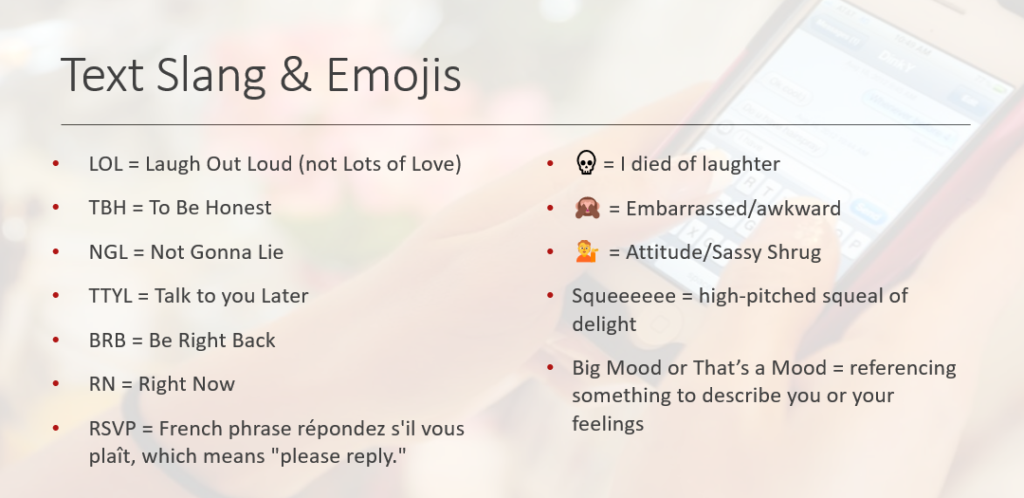12 Tips for Professional Communication
Have you ever struggled to write an email to your professor? Has someone ever misunderstood your text? It has to do with mastering the art of professional communication. Don’t be thrown off by the word “professional.” Professional communication means being clear and respectful—and anyone can master this skill. Here are the Career Center’s top tips for communicating like a pro:
1. Master Your Body Language
Just as your words send a message to someone, your body language also sends messages. You can tell someone out loud, “You annoy me.” You can also roll your eyes and communicate the same message without ever uttering a single word. Whether you’re speaking to someone in person, or meeting with someone virtually, remember that your body sends messages about whether you’re paying attention and how you’re feeling.
Eye contact says, “I’m listening to you.” The tone of your voice can convey whether you’re bored or excited. Slouching says, “I’m not interested” while a smile says, “I’m interested and glad to see you.”


2. Treat Virtual Meetings like In-person Meetings
Remember that a virtual meeting is still a real meeting with a real person. All the rules of an in-person meeting apply in a virtual space, too! Come prepared with whatever materials you may need. Show up at least five minutes early in case of delays and download any meeting software in advance.
Remember: Being respectful isn’t just about what you say with your mouth. By texting on your phone or looking away from the camera, you can say, “I don’t want to be here” just as clearly as if you said those words aloud.
Lastly, use a professional username when you meet on a video chat service. (KittenCuddler87 and SurferBro38 aren’t recommended!) This helps others in the meeting easily identify you.
3. Introduce Yourself when you Pick up the Phone
Because you don’t have your body language to rely on, phone calls require you to communicate clearly with words alone. If you’re calling someone or receiving a call from someone you don’t know, it’s critical to identify yourself. For example: “Hello, this is Jessica Smith from Eastern Florida State College’s academic advising office.”
4. Set Up a Professional Voicemail
Voicemail represents you when you’re not around. Start by introducing yourself by name—again, it’s important to let the caller know they’ve reached the right person. You might have an old voicemail that you recorded mostly for friends to hear, but consider that this voicemail might not make a great impression on an employer calling to interview you or a school considering you for a scholarship. Avoid slang, profanity, or other improper language in your voicemail.
5. Return Calls & Messages within 24 Hours
If someone leaves you a voicemail that needs to be returned, be sure to do so within 24 hours—or the same day, when possible. This shows respect for the other person’s time and needs.
6. Don’t Multitask on the Phone
To show respect to the other person, don’t eat, drink, or multitask while on the phone. We all live busy lives, but doing other activities while speaking with someone gives the message, “You aren’t that important. I have other things to do than speak with you.”
7. Think Before You Post
What you put online stays there forever. Employers often perform a background check when choosing whether to hire you, and their first step is to type your name into a search engine, check out your social media, and see if you have any dubious content.
Florida is an “at will” state, meaning an employer can fire you anytime without consequence. Many employees have had this experience. They post about something on social media, it’s discovered by a coworker who reports it to management, and the person is let go because the content is considered bad for the company’s image.
You might think that a platform like Snapchat is a safer bet—after all, the content only appears for a few moments, and it’s only shared with certain people, right? However, it’s possible for others to screen-record your content and post it publicly.
The ultimate bottom line is: Have fun on social media but be mindful of the messages you may send. Assume that anything you post could be seen by the world, by your boss, by the person reviewing your job application, by your teacher, or by your advisor.
8. Polish Your Texting
These guidelines aren’t for texting family and friends but for texting someone professionally, such as a co-worker, boss, teacher, or advisor.
First: It’s critical that you get permission to text. Sometimes texting isn’t an acceptable form of communication or may even violate organizational rules.
Only text your co-workers, boss, or other professionals during normal business hours. If the business is open 8:00 am – 5:30 pm, don’t text at 10:00 pm or 3:00 am. That’s disruptive to the other person’s life.
Reply promptly. Because text messages are more “instant” than email, it’s appropriate to respond to them as quickly as possible; think of texting as a real-time conversation and keep a good flow until the goal of the conversation is achieved. Keep messages short so you can make the best use of your time.
Lastly, never say over text what would be better said in person. If you need to tell your supervisor you’re planning to leave, for example, it’s most respectful to schedule an in-person meeting.
9. Use Group Chat Sparingly
In a group chat, every message you send gets sent to everyone. Group chats in a professional context aren’t ideal for casual conversations and should be used for announcement-style messages only. Sending group texts sparingly helps prevent overflooding of others’ message boxes.
10. Be Mindful of Slang – Clarity is the Goal!
Look at this list of texting slang. Some are as old as instant messaging, while others have become more common through certain subcultures and social media platforms. Which ones do you recognize? Which ones are new to you? It’s important to remember that, just as you might not know the meanings of some phrases, abbreviations, and emojis, others might not recognize them. When you’re communicating with someone in a professional setting, what’s most important is clarity. This ensures that your message is understood and can be answered quickly and accurately. Say things as plainly but politely as possible.

11. Live Chat is STILL a Real Conversation
It’s common for businesses and colleges to use instant messaging to provide immediate assistance. To make the most of your live chat, don’t use all CAPS when texting as this sounds like “yelling” to the other person. It could convey that you are angry or disrespectful.
Spelling and grammar are important, even in instant messaging. Sure, you won’t be docked points for a misspelling, but for the sake of professionalism and a clear message, make sure none of your words have a red squiggle underneath. If so, right-click and spellcheck before sending.
Think before you type. If you’re feeling upset or angry, you might say something you later regret. If you’re feeling especially emotional, wait ten minutes until you have a clearer head. Be kind, respectful, and professional. Remember, the other person wants to help you, and certain problems may take time.
12. Write Effective Emails
Is your subject line filled in? Does your message greet the person by their name and title? Is your message as short as possible—about five sentences? Do you thoroughly identify yourself? Do you clearly explain what you need? Will the recipient need to email you back for clarification or do you include everything necessary for immediate action? Do you close out your email? Do you sign your name? If your email meets all these requirements, hit “send!” It’s ready to go.
Why does Professional Communication Matter?
Whether you’re posting a clip on TikTok, emailing an instructor, or meeting for a group project, it’s important to know how to say exactly what you want your audience to hear. When you communicate clearly, respectfully, and concisely, it helps avoid misunderstandings and builds relationships with others. It also increases productivity. Because there’s less room for confusion, you can get things done faster and get what you need more quickly.
Lastly, professional communication says a lot about you—the kind of person you are, how you respect yourself, and how you want others to perceive you. Think of it as enhancing and reinforcing your personal brand. What words, phrases, ideas, and attitudes do you want to be associated with you? That’s the power of communication.
Have questions about professional communication? Reach out to your campus’s Career Center! We look forward to working with you!
- Leave Your Legacy (Paver) at EFSC - April 24, 2024
- Five Anime To Watch in College - April 10, 2024
- Dress for Success: All About the Titan2Titan Clothing Closet - April 3, 2024







